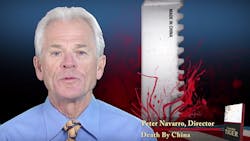Avoiding Death by China, Trump Taps Navarro to Lead New Trade Council
Donald Trump remains a little more than four weeks out from his formal inauguration as our next president, but his appointments and committee creations are in full swing and are grabbing plenty of attention — perhaps none more so than the formation of the White House National Trade Council.
The council is in line with Trump’s campaign promise to “make America great again” by focusing on domestic production and jobs and, in turn, by seeking the best deals no matter historical relationships. It also appears to be another push against China, thanks to the selection of Peter Navarro, an economics professor at the University of California at Irvine whose criticisms of China’s trade policies stretch back decades and are widely noted, to lead it.
The council will be tasked to advise Trump “on innovative strategies in trade negotiations, coordinate with other agencies to assess U.S. manufacturing capabilities and the defense industrial base, and help match unemployed workers with new opportunities in the skilled manufacturing sector,” according to the president’s transition team.
No surprise then, that it has already received praise and support from industry groups and leaders.
“For too long, our trade policies haven’t been focused on supporting our manufacturing sectors, (and), in many ways, have undermined it,” Alliance for American Manufacturing president Scott Paul said. “This new council could be an important part of a strategy to make sure that America can compete and win.”
Likewise, Jay Timmons, the president and CEO of the National Association of Manufacturers, said that Trump has “sent another clear signal to the millions of Americans employed in manufacturing that they will be put first in his administration,” and that, “we look forward to working with the President-elect and Dr. Navarro to enact the policies we need to strengthen and grow manufacturing in America.”
Tim Murphy, a Pennsylvania congressman and chairman of the Congressional Steel Caucus, said that Trump “has laid out an aggressive agenda to champion American steel, hold our global trading partners accountable, and craft strong trade agreements that bring jobs back home to manufacturing regions. … This is an exciting time.”
While the council has received headlines because of its mere existence, a good chunk of the attention has come because of Trump’s decision to put Navarro in charge.
Navarro has been a vocal critic of China and its trade relationship with the United States. He has blamed NAFTA and China’s entry in the World Trade Organization back in 2001 for an economic slowdown in the United States (with an average annual growth rate of 1.8% since 2001, compared to 3.4% for the immediately previous 15 years).
He has also written three books about the topic, including The Coming China Wars and Crouching Tiger: What China’s Militarism Means for the World, and directed and released a documentary, Death by China: How America Lost Its Manufacturing Base, based on his 2011 book of the same name. (Michele Nash-Hoff reviewed the book for IndustryWeek, speaking with Navarro’s co-author, Greg Autry, back in 2012 .)
“Even as thousands literally die from this onslaught of Chinese junk and poison,” Navarro and Autry wrote, “the American economy and its workers are suffering a no-less-painful ‘death to the American manufacturing base.’”
Trump said he read at least one of the three books and “was impressed by the clarity of (Navarro’s) arguments and thoroughness of his research. He has presciently documented the harms inflicted by globalism on American workers, and laid out a path forward to restore our middle class.
“He will fulfill an essential role in my administration as a trade adviser.”
What, exactly, Trump has in mind for Navarro and the National Trade Council remains unsure, of course, but a look at Navarro’s previous statements and opinions can give a pretty good idea. Among his key opinions is that China practices a twisted form of capitalism that works with major American corporations to undermine the U.S. economy — helping those companies in the short term by providing them with cheap labor, later using information gained against the United States. He also argues that China will not, counter to public statements, become more open over time.
Navarro has repeatedly said that China’s trade transgressions against the United States include illegal export subsidies, currency manipulation, intellectual property theft, and poor worker safety and environmental standards.
In 29 days, Trump will be inaugurated and the council can get to work.
About the Author
Matt LaWell
Staff Writer
Staff writer Matt LaWell explores news in manufacturing technology, covering the trends and developments in automation, robotics, digital tools and emerging technologies. He also reports on the best practices of the most successful high tech companies, including computer, electronics, and industrial machinery and equipment manufacturers.
Matt joined IndustryWeek in 2015 after six years at newspapers and magazines in West Virginia, North Carolina and Ohio, a season on the road with his wife writing about America and minor league baseball, and three years running a small business. He received his bachelor's degree in magazine journalism from Ohio University.
